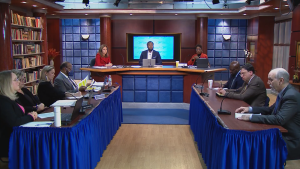Jan. 23, 2024 — Positions in nearly every state agency are in dire need of filling – more than 12,000 in all, according to the governor’s most recent Executive Budget proposal. To help agencies fill positions with a diverse pool of applicants, the Department of Civil Service (DCS) launched the Hiring for Emergency Limited Placement Program, also known as “HELP,” on April 5, 2023. As part of the program, the Civil Service exam for certain titles is temporarily waived. DCS says more than 6,500 people have been hired since HELP was launched.

Now DCS wants to expand the program. On January 18, during a hearing with agencies and unions, the Department of Civil Service announced NY HELPS, with the intention of streamlining appointments to all open-competitive positions.
PEF was present at the hearing and voiced support for NY HELPS but urged caution about relying on it as a fix to the larger staffing issue the state faces.
“To PEF, Civil Service protections are so critical, not only to PEF’s members, but critical to the public, and critical to the individuals served by agencies,” said Research Associate Jean-Rene Shekerjian, who testified at the hearing, representing the PEF Civil Service Enforcement and Research department. “We have concerns that as Civil Service protections are made more flexible, there are more opportunities for harm to be done.”
As a result, PEF President Wayne Spence made sure DCS placed a one-year time limit on the program. President Spence supports NY HELPS as a means to lighten the workload on PEF members who are overworked, and to adequately staff understaffed agencies. However, without a clear time limit, President Spence was concerned that the program would weaken ongoing efforts to protect existing State employees and PEF members.
Video: Watch the Jan. 18 Department of Civil Service hearing (PEF testimony begins at about 23:00)
For PEF and President Spence, it is not only open-competitive positions that need focus, but promotional positions as well. President Spence was able to reach an agreement with DCS to make sure that vacant positions which could be filled via promotional lists of current employees were given first consideration ahead of any individuals outside of the State workforce.
“We felt very strongly that our members needed to be assured that if there were sufficient numbers of them in the promotion field that the agency would have to go to the promotion field first [before appointing someone who was not in the promotion field],” Shekerjian said. “We’re grateful that we were able to work out an agreement that we believe will protect our members.”
Even with the NY HELPS program, PEF believes that in addition to hiring, retention must be high on DCS’ radar because both are caused by the lack of competitive salaries. The governor and legislature called for a study to examine pay grades across all State titles, which DCS is in the process of sending out to bid, and which PEF believes will provide enough data to merit a two-grade increase for all positions.
But beyond that, Shekerjian said, there are ways for the State to increase compensation without a lengthy period of review.
“The previous administration, we believe, was much too strict in limiting the salaries paid for these positions and we think it has had a very detrimental effect,” Shekerjian said. “PEF encourages the Department of Civil Service to seriously consider approving many more Geographic Pay Differentials and Increased Hiring Rates.”
In addition to measures that will increase PEF members’ compensation, President Spence is focused on making sure Tier 6 reform is on the table as well. Even with changes to pay and waived exams, President Spence believes that improving the current tier of the State pension is crucial to attracting and retaining skilled professionals. PEF is advocating for employee pension contributions to be standardized at 3%.
Lastly, President Spence’s push to define workplace bullying and clean up toxic workplaces should help the State hire new people and keep the ones they have. The idea is simple — workers are more likely to stay in jobs where they are treated fairly and see a ladder they can climb for career success.
To that end, there is a call for regional testing centers to be properly staffed and supported. As part of legislation passed last year, 12 computerized testing centers are planned to be opened across the state. However, there still needs to be more staff at these centers, as well as a modernization of exams.
This requires adequate staffing at DCS as well. In 2001, Civil Service employed nearly 700 people. At the start of 2023, there were only 357 DCS staffers.

